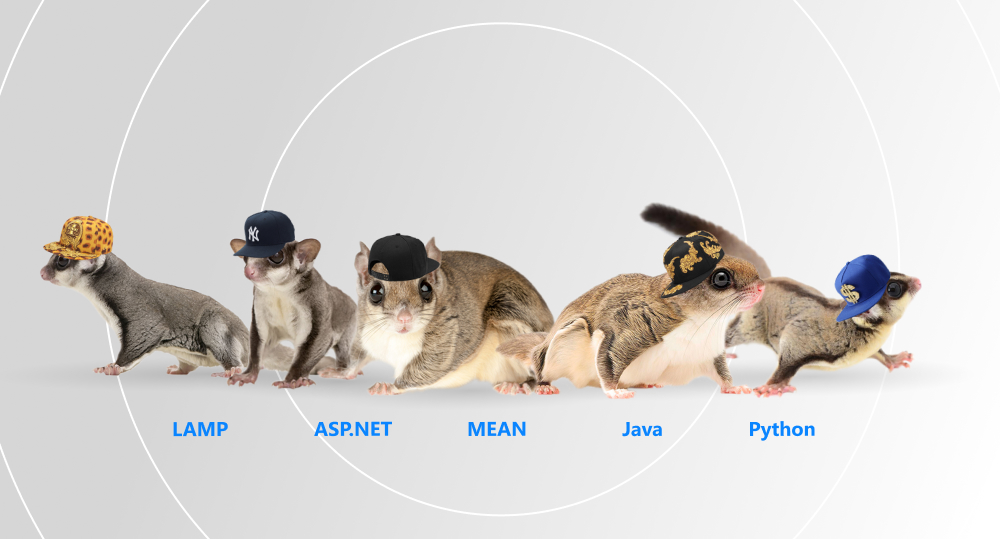“How much does it cost to create a website in the UK? What tool should I use to design it? And what should I be ready to discuss with the company that will build a website for me?”
If you own a business in the Untied Kingdom and want to create a website, all these questions have definitely crossed your mind. That's why, to help you out, we decided to come forward and prepare answers to the most frequently asked questions about web design.
Without further ado, let's get a clear vision of how to build the website of your dreams.
written by:
Pavel Kuluev
Software Developer
Contents
Q#1: Website Builder, WordPress, or Dedicated Web Developers: How to Choose?
When you need to build a website, the conversation starts with defining the size of your business and your needs.
For a simple website such as a promo website or an online store, your best choice is a website builder. Website builders are affordable platforms and programs that allow you to create a website quickly with a variety of tools and templates. The good thing about a website builder is that you don't have to touch the code, and your team can craft and manage the site on their own, without professional assistance. Also, these platforms allow saving money if you are on a budget.
For an eCommerce business, a website builder is a real gem: this tool allows you to keep track of the inventory and shipping and take care of payments. You can use such website builders as Shopify, Zyro, or BigCommerce. Apart from great functionalities for web design, these platforms are very easy to use, which means that you can start selling on your eCommerce website fast. Isn't that the goal?
Another cost-effective option is to design a website with WordPress — a content management system for building and hosting websites. It is used by 43% of all websites, offers a big number of free templates, and allows adding plugins.
Just like website builders, WordPress is perfect for blogs and portfolios, it works great when creating an online store and makes your eCommerce website stand out.
Let's compare these two website-building tools.
Website Builders
no learning curve
has a learning curve
offers a visual drag-and-drop interface
no visual interface (what you see in a form editor isn't always how the page will look for website visitors)
no need to work with code
some coding may be required to make a plugin or a template work
less flexible
offers more flexibility due to plugins
hosting is included with every website builder, so you cannot move the website to another host
you need to install your WordPress site on a web host (this requires some technical knowledge), which means you can move your website to another host
Websites made with WordPress or web builders are very convenient because they can be handled by people with little to no technical knowledge. That said, if you need to craft a website with standard functionalities quickly without a web designer, these two tools are your ticket to the bright world of the web.
However, if your goal is a complex website with extended functionalities, easily supported by any platform, it's best to reach out to web developers. They have the expertise required to build bespoke websites tailored to the specific needs of your business and your customers.
Q#2: What Are the Reasons to Hire a Web Developer?
As we briefly mentioned above, for a complex website with a lot happening on the back end, a web developer is your go-to person. Why? Let's be honest: sometimes websites can give you a headache, and it's best to find a way to relieve it than keep suffering.
So, let's take a look at the reasons why a website design agency with a few developers or a software house is the ultimatum painkiller when it comes to creating a website.
UX That Serves the Purpose
Visually, a website created with a builder or a CMS has every chance to be appealing. However, to assemble all pieces of the puzzle into a complete picture called a website is a task for an expert. Simply put, while your UI might be great, if you use a pre-designed website, the user experience might not as user-friendly as you anticipated.
Information architecture (IA), i.e., the practice of structuring information to match user needs, is a vital part of UX. Without proper content structure and site navigation, the product will be unusable. Both IA and UX should serve you. To achieve that, they should be custom-made to meet your specific needs.
Box UK writes, good development companies with experienced web designers can offer you a solution "optimized for maximum impact by employing user-centric design, validating this with user testing to confirm it resonates with your target audience."
High Security and Wide Functionalities That Work
The implementation of complex integrations and solutions is a web developer's job. So, a competent specialist will ensure that your website's code is great, as well as the speed at which the site operates. On top of that, unlike pre-designed applications and web systems that are neither adaptable nor scalable, your website can grow with you because it was developed following your needs and with the usage of the latest technologies.
Also, a professional will ensure that your website is secure. The absence of third-party plugins (used by platforms like WordPress) will also shield your website from possible vulnerabilities.
FYI: Third-party plugins can be quite unreliable. They may come into conflict not only with other plugins, but also with general system updates across WordPress.
Better SEO Services
With a bespoke website, you're going to have full control over the code. Thus, right from the start, you can build in search engine optimization and get discovered better. The code of your custom-made website will be implemented with specifics of your business and customers in mind. Thus, search engines will connect you and your audience easier and quicker.
Accessibility from Any Device
With a professionally executed website, you don't have to worry that it will not properly load on a tablet in Safari or an Android-based phone in Chrome. Everything will work at all times, period. This is something that might be difficult to achieve when using a website builder or a WordPress site.
Q#3: Bespoke Websites: What Should I Be Ready to Discuss?
Here, at Qulix, we provide custom web app development services. Often they are for fintech companies.
When we receive a request, our first task is to understand what the client needs. So, to build a bespoke website, we interview them.
What do we usually talk about?
Back End Is Primary Focus
First and foremost, when talking about a complex website, we're talking about a bunch of connected web systems to develop. E.g., if you need to create a search tool, it will look simple on the front end: it's one page with a field for entering the text. However, the back end is extremely complex. For example, Google Search works in 3 stages: crawling, indexing, and serving search results. This means that first, Google downloads all data from pages it found online with automated programs called web crawlers. Then, Google analyzes all the data and stores it in the Google index, which is a large database. And finally, when a user submits a search request, Google responds with relevant information.
Thus, the thing about websites is that while UI is an important part of the game, it doesn't define it. Just like with an iceberg, UI is just the top that you see. The rest of the iceberg, the back end where the real complexity lies, is hidden beneath the surface. So, the actual challenge and concentration point when crafting bespoke websites is code.
Feature Matrix Is a Must
We analyze web development from the perspective of the services that our client provides. So, to build a web system, we need to estimate its size and define its functionalities. Thus, we form a feature matrix, i.e., a hierarchy of features that are vital for the client from the business aspect. For example, the matrix might include things like a log-in option, management of requests, payments, etc. So, we write down these requirements to define the type of services that the web system in question provides to the end client.
Channels
The next topic on the agenda is channels, i.e., how our client is going to communicate with customers. Ideally, users should be able to use the services of the client from anywhere. So, we need to understand if the client wants just a website, or, perhaps, they also need a mobile app and accessibility to their services through an ATM.
Design
As to the design of the website, we need to determine who takes it on: we or an outside web design agency. If it's the latter, we insist on collaboration. This is due to the fact that sometimes, design studios do not have enough knowledge of the domain, system analysis, and/or system architecture. Thus, during the development process, a web developer might realize that they cannot implement quite a few elements.
So, if it's a design agency, our analysts work closely with the team to ensure that the design is going to serve the functionality of the website.
Web Hosting
In this day and age, web hosting on a cloud is a common practice. If there are cloud services that the client prefers, we're open for discussion. And, on the contrary, we can come forward with options of our own.
If cloud hosting is not an option for some reason, we can offer to use a data center and rent the equipment to host the website there.
Tech Stack
Here, we need to find out if our client has any preferences in technology. If so, our next step is to analyze whether it fits the project. If there are no preferences, we're going to act based on our experience and expertise.
Localization
We need to know what languages the website has to support. If there are a few, it's important to establish who's going to take care of the translation of the website content.
Other issues brought up for discussion are the content management system (who adds new content and how to do it), deadlines, and budget.
We also offer website maintenance if the client is interested in that.
We are flexible and allow a room for changes in the course of website development. Nevertheless, we always think through and write down the main requirements for the website to ensure that we and the client are on the same page.
* By the way, we have a few tips on how to gather a great web development team. Come check them out!
Q#4: How Much Does a Website Cost in the UK?
Since one of our offices is located in the UK, we decided to concentrate on the British market this time. So, let's take a look at the cost of setting up a website there.
Sure thing, there is no simple answer to the question "How much does a web design cost in the UK?", since it depends on many factors:
- the type of the website (a plain website such as a portfolio site or a brochure site, an eCommerce site for a small business, a complex bespoke site for an enterprise, etc.);
- how it's built (a website builder, WordPress, web design agencies, developers, and/or software companies);
- the costs of services of a professional web designer and a web developer if you choose their assistance;
- the overall complexity and the size of the system.
Thus, you can get the precise website costs only if you reach out to a certain company with the list of your requirements or explore a specific website builder.
Website Builders
With a website builder, your main expense area is the subscription. It usually includes a hosting service, a custom domain name, and templates. As Startups.co.uk reports, the subscription price may vary from £0 to £30 a month for a basic website. For eCommerce websites, such as Shopify or BigCommerce, the price can rise as high as £240.
This means that the site built with a website platform can cost up to £240/month.
WordPress
Hosting costs vary from £25 to £600/year and depend on the type of hosting and the subscription you choose. Often, hosting plans include a free domain name. Of course, if that's not the case, you can add up the domain costs (£3–£100/year). Plugins (up to £100/month) and support (£10–£150/hour) also jump on your expense list.
All in all, the WordPress website's cost will be about £30–£1,000/year.
Bespoke Websites
Here, costs vary drastically, as they depend on the size of the web system in question and hourly rates of web developers. The larger the web development company is, the more expensive the work of their specialists will be.
Bespoke sites' prices start at £10,000. Apart from that, a domain name can cost as much as £100, and hosting costs have the potential to reach £600. Security (up to £200/year) and maintenance (0–£1,900/year) are other aspects that will require finances.
Where Did This Train of Thought Lead Us?
Website development is an exciting process. However, it has multiple layers, where each is equally important. Thus, to craft a slick website for your business, you must have a crystal clear understanding of the direction you are heading to.
Your vision defines the type and the size of the web system, and it determines the tools that will bring it to life.
Regardless of how you choose to build your website, the vital thing to remember is that it's the website that should serve your needs, and not the other way around.
If you have any burning questions about website development, please feel free to contact us. We'll be happy to help you find the answers and build a state-of-the-art website for you.

Contacts
Feel free to get in touch with us! Use this contact form for an ASAP response.
Call us at +44 151 528 8015
E-mail us at request@qulix.com











